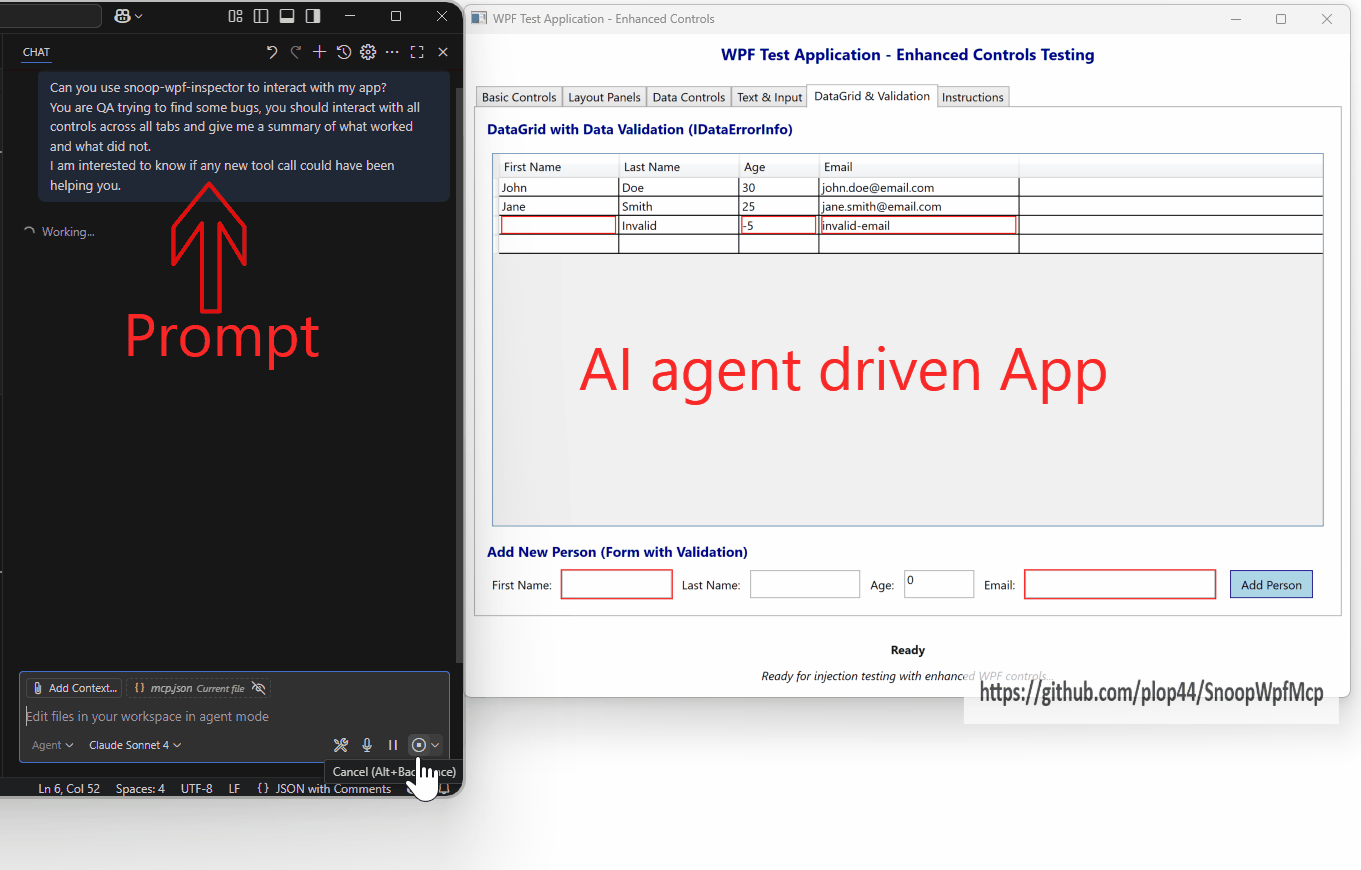A Model Context Protocol (MCP) infrastructure for WPF applications using snoopwpf injection techniques. Allows code injection into running WPF processes and communication via Named Pipes.
WpfInspector MCP Infrastructure
🚧 Work in Progress 🚧

Note: This project was "Vibe coded" (AI-assisted rapid prototyping) but it's looking very promising!
Overview
A Model Context Protocol (MCP) infrastructure for WPF applications using snoopwpf injection techniques. Allows code injection into running WPF processes and communication via Named Pipes.
Quick Start
As MCP Server
Add this configuration to your MCP client's mcp.json:
{
"servers": {
"wpf-inspector": {
"type": "stdio",
"command": "dotnet",
"args": [
"run",
"--project",
"c:\\Users\\guenn\\source\\perso\\SnoopMcp\\MCP\\Injector\\Injector.csproj",
"--configuration",
"Debug"
],
"env": {
"DOTNET_ENVIRONMENT": "Development"
}
}
},
"inputs": []
}
MCP Functions (KernelFunction)
Process Discovery
get_wpf_processes: Gets interesting WPF processes, excluding system components like explorer, TextInputHost, etc. Returns user applications and development tools that are most likely to be targets for inspection.get_process_info: Gets detailed information about a specific process by Process ID, including whether it's a WPF application.
Communication & Control
ping: Sends a ping command to a specified WPF process (by Process ID) and returns the response. This establishes communication with the target WPF application.run_command: Executes a command on a specific UI element in a WPF application. Finds the element by type and hashcode, then executes the specified command. Supports various commands like CLICK, SET_TEXT, GET_PROPERTY, SET_PROPERTY, INVOKE_METHOD.
UI Inspection
get_visual_tree: Gets the visual tree of a WPF application as JSON. Takes a process ID as input and returns the complete UI structure including all controls, their properties, and hierarchy.take_wpf_screenshot: Takes a screenshot of the MainWindow of a WPF application. Finds a WPF process (by PID or name) and captures a screenshot of its main window. Returns the screenshot as base64-encoded PNG data. ⚠️ WARNING: This function is SLOW compared to get_visual_tree. Use get_visual_tree instead for fast inspection of UI state - only use screenshots when you specifically need the visual appearance.
Components
- WpfInspector: Injected .NET library providing UI automation via Named Pipes
- Injector: Console app that performs injection and communicates with target process
- TestApp: Simple WPF test application
Key Features
- ✅ Process injection using snoopwpf infrastructure
- ✅ Visual tree inspection with element details
- ✅ UI element interaction (click, text input, properties)
- ✅ Screenshot capture (PNG/base64)
Logs & Troubleshooting
- Logs:
%TEMP%\WpfInspector.log
License
This project is licensed under the MIT License - see the LICENSE.md file for details.
Note: This project includes SnoopWPF as a submodule, which is licensed under the Microsoft Public License (Ms-PL). See the SnoopWPF license for details.